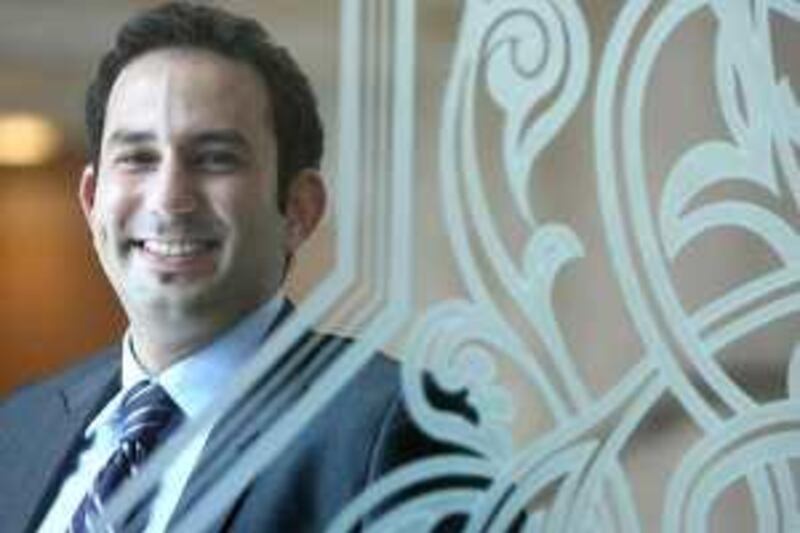NEW YORK // Ussama Dahabiyeh recalls with great fondness his three-week trip to the United States last year on a business fellowship. At a closing ceremony for the programme last October, he told the assembled guests: "I am happy to say that my name is Ussama, I crossed the US from east to west twice, went to Ground Zero, visited the Senate and was not arrested!" Mr Dahabiyeh is one of 28 young executives who have participated in the Arab & American Business Fellowship programme, the only private sector-led exchange that sends Arabs to the United States to foster corporate relationships and sends Americans to do the same in the Middle East. Mr Dahabiyeh, who is 30 and an associate in the aerospace unit of Mubadala, the investment arm of the Abu Dhabi government, said he and 11 other Arab fellows followed a hectic schedule.
The fellowship started with a week in New York visiting 12 companies. The fellows were then split into three groups for the second week, with his group going to Seattle to visit Boeing and Microsoft and the other two groups going to Iowa and Michigan. The final week was spent in Washington, DC, where they got a "flavour of American politics and administration". "Everyone was open, friendly and amazingly down to earth," said Mr Dahabiyeh. "We discussed everything in our meetings; business, economy, lifestyle, history, stereotypes, politics, etc." One of the driving forces behind the fellowships is Keith Reinhard, chairman of Business for Diplomatic Action, a non-profit group that aims to improve the standing of the United States internationally through the business community. The group organises the fellowship with Young Arab Leaders, the Dubai-based non-profit organisation that seeks to promote Arab entrepreneurship. Mr Reinhard said he became concerned about his country's reputation even before the US-led, 2003 Iraq war, which inflamed passions, particularly in the Middle East. Surveys conducted in 2002 showed although there was widespread sympathy in the wake of the September 11 attacks, there was also a great deal of resentment at the perceived arrogance of the United States as it asserted its role as the world's only superpower after the end of the Cold War. "Globalisation exacerbated the problem because it was seen as good for America but not everybody else," said Mr Reinhard, who felt the election of Barack Obama was a positive step but more work was still needed to regain international trust. "He cannot do it alone and needs the help of the private sector, business, academia and private citizens." An earlier initiative of Business for Diplomatic Action was the distribution of a pamphlet called the World Citizens Guide to US students before they travelled abroad. The advice was aimed at fostering cultural awareness and a chapter called You're not in Kansas Any More told students: "Don't be the tourist who tries to impose the American way on others because you think our way is better." "Fortunately for us, we live in a country where we have the freedom and the choice to vote and have a say on these types of issues," the booklet said. "In many countries, that is not the case. This doesn't mean that we are better than they are. Many governments were in place long before our country even existed." Raghda Shaheen, a 26-year-old Palestinian-Canadian born in Kuwait, said the fellowship programme was a "great learning experience on both sides". "I also believe that it was a valuable chance to bridge both cultures and to further break the stereotypes on both ends," said Ms Shaheen, who is a senior business process consultant at the Dubai International Financial Centre. Alaa Zayed, 29, was born in Egypt and is assistant vice chairman at Gulf Group Holding Co, an industrial company, in Kuwait. "I was astonished by the simplicity of life and how the Americans are so humble and friendly," he said. Saiid Saber, 30, was also struck by the friendliness of the Americans he met. "Having had the chance to take a look from the other side of the telescope, I would have to say that life in the US is just different from what the media and Hollywood convey," said Mr Saber, who works for Rox Management Consultants in Beirut. Mr Reinhard last week gave a reception for US company representatives and others involved in the fellowship at his sumptuous 70th floor apartment in the Time Warner Center at New York's Columbus Circle. Among the guests being wooed to sponsor 30 Arab fellows later this year was Jay Kriegel, a senior adviser to the Related real estate company, which has already hosted some Arab executives. He told the guests that he had felt "ginger" before meeting the Arab fellows but was pleasantly surprised when they expressed an interest in learning about the Jewish day of Yom Kippur, a solemn holiday known in English as the Day of Atonement. "They were incredibly enthusiastic and I know a little more about their holidays too now," he said. The American fellows spend three weeks in the Middle East visiting companies that have included the Abu Dhabi Media Company, Dubailand and the Dubai International Finance Centre. Jeff Forsythe, who works in speciality sales for United Airlines, said he had started learning Arabic after his fellowship spent in Abu Dhabi, Dubai and Kuwait City. He had also stayed in touch with some of the Arab fellows he met in the Middle East and who had already proved useful in his work. "We noticed recently a surge in travel to Beirut so I called my Lebanese friend who quickly told me about the elections and also the booming real estate market," he said. "I think what surprised me most was the drive and ambition of the people I met and I was not prepared for this." sdevi@thenational.ae





